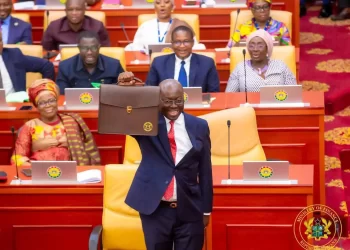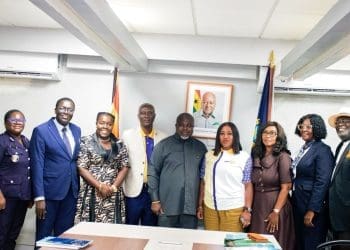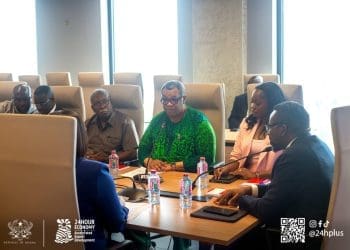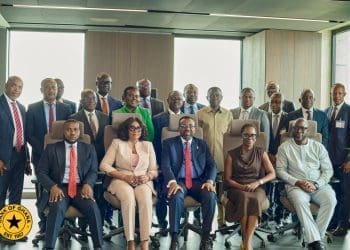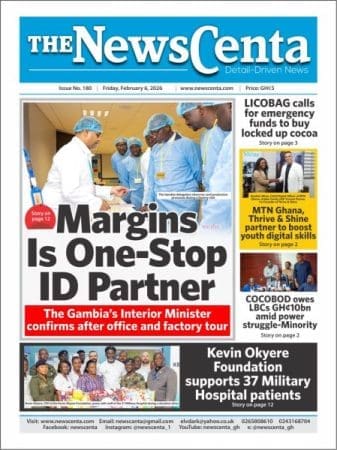More than 2,700 public and private sector leaders from the United States and Africa gathered in Luanda from June 22 to 25 for the 17th US-Africa Business Summit, marking a record-breaking edition of the annual event.
Hosted by the Corporate Council on Africa in collaboration with the President of Angola, this year’s Summit attracted 12 African Heads of State and some of the highest-ranking U.S. officials focused on trade and development across the continent.
The large U.S. delegation was led by Ambassador Troy Fitrell, Senior Bureau Official for African Affairs. Other senior officials included Massad Boulos, Senior Advisor for Africa; Thomas Hardy, Acting Director of the U.S. Trade and Development Agency; Constance Hamilton, Assistant U.S. Trade Representative for Africa; Connor Coleman, Head of Investments and Chief of Staff at the U.S. International Development Finance Corporation (DFC); and Tamara Maxwell, Senior Vice President for Small Business at the U.S. Export-Import Bank.
Their mission was clear: to boost U.S.-Africa trade and investment partnerships through strategic deal-making and to reinforce the U.S. government’s push toward commercial diplomacy, advancing prosperity through investment rather than aid.
$2.5bn in new U.S.-Africa deals
The Summit culminated in the announcement of over $2.5 billion in new trade and investment deals between American and African partners.
These agreements spanned infrastructure, energy, digital technology, logistics, and tourism, showcasing the growing appetite for private sector-led development across the continent.
The record commitments reflect a deliberate shift in U.S. foreign economic policy, emphasizing long-term partnerships and sustainable growth.
“This is about working with African nations as equals,” Ambassador Fitrell noted, “and expanding the pathways to shared prosperity.”
Angola gets grain infrastructure project
A flagship deal signed during the Summit saw Florida-based Amer-Con Corporation leading a U.S. consortium to build and operate 22 grain silo terminals along Angola’s Lobito Corridor. Backed by the U.S. Export-Import Bank, the agreement with Angola’s Cargo and Logistics Certification Regulatory Agency is expected to enhance food security and agricultural logistics in Angola, providing crucial infrastructure for grain storage and distribution.
Boosting Angola’s digital capacity
In another landmark deal, U.S. tech firm Cybastion partnered with Angola Telecom in a $170 million investment aimed at expanding the country’s digital infrastructure and cybersecurity. Dubbed the “Digital Fast Track” initiative, the project includes modern ICT infrastructure and local workforce training, a vital step toward Angola’s digital transformation.
First U.S.-sourced LNG terminal in West Africa
CEC Africa Sierra Leone Ltd., in collaboration with U.S. energy infrastructure company AG&P, signed an MoU to develop West Africa’s first U.S.-sourced LNG terminal.
The facility, backed by the U.S. International Development Finance Corporation, will supply affordable liquefied natural gas to the 108-megawatt Nant Power Project in Sierra Leone—supporting both industrial and residential energy needs.
Hydropower and cross-border energy
The Ruzizi III Holding Power Company signed an agreement with U.S.-based Anzana Electric Group to facilitate a 10% equity stake in a $760 million hydropower project straddling Rwanda and the Democratic Republic of Congo.
Once completed, the project will deliver reliable electricity to over 30 million people and strengthen regional economic integration.
Meanwhile, U.S. energy firm Hydro-Link agreed with the Angolan government to construct a $1.5 billion, 1,150-kilometer transmission corridor.
The private energy line will deliver up to 1.2 gigawatts of hydropower from Angola’s Luaca Dam to critical mineral mines in the Kolwezi region of the DRC—a major leap in supporting Africa’s mineral-driven green transition.
U.S. investment in Ethiopian hospitality and tourism
Ethiopia Investment Holdings signed a $200 million MoU with U.S. International Finance Partners to develop luxury hotels, branded residences, and tourism infrastructure.
The initiative is closely aligned with the vision of Ethiopian President Taye Atske Selassie, who attended the signing and expressed confidence that the project would catalyze job creation and economic diversification.
A Strategy rooted in commercial diplomacy
Throughout the Summit, the U.S. government reiterated its policy of “trade over aid,” emphasizing that economic cooperation should be anchored in private investment, local job creation, and market-based development.
The deals showcased reflect a more strategic and long-term approach to U.S.-Africa relations—one that prioritizes business-to-business partnerships and mutual benefit.
In the words of Constance Hamilton, Assistant U.S. Trade Representative for Africa, “We are not here to dictate terms. We’re here to listen, invest, and grow together.”
The next U.S.-Africa Business Summit is expected to build on this year’s momentum, with plans already underway to deepen bilateral engagement and scale high-impact investments across more sectors and countries.





